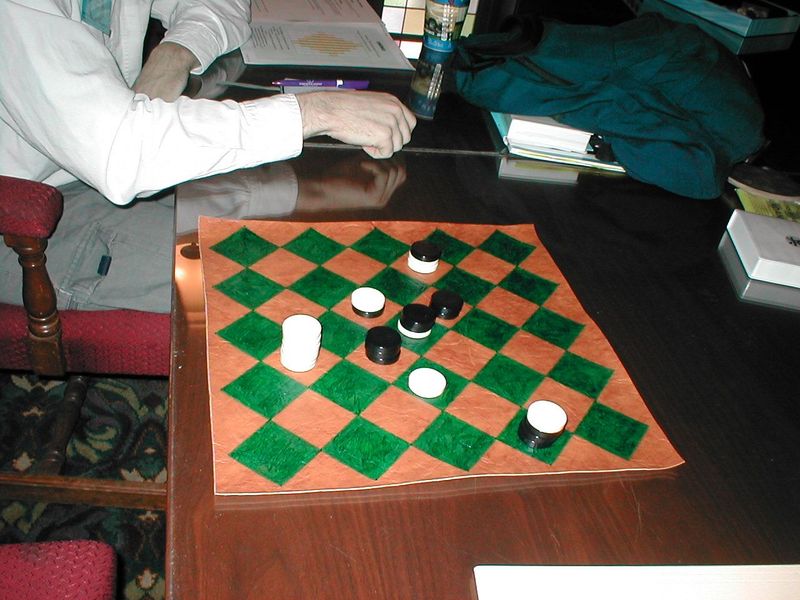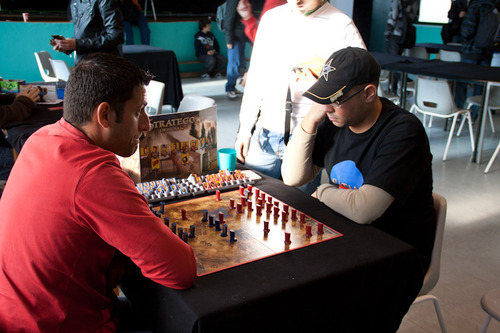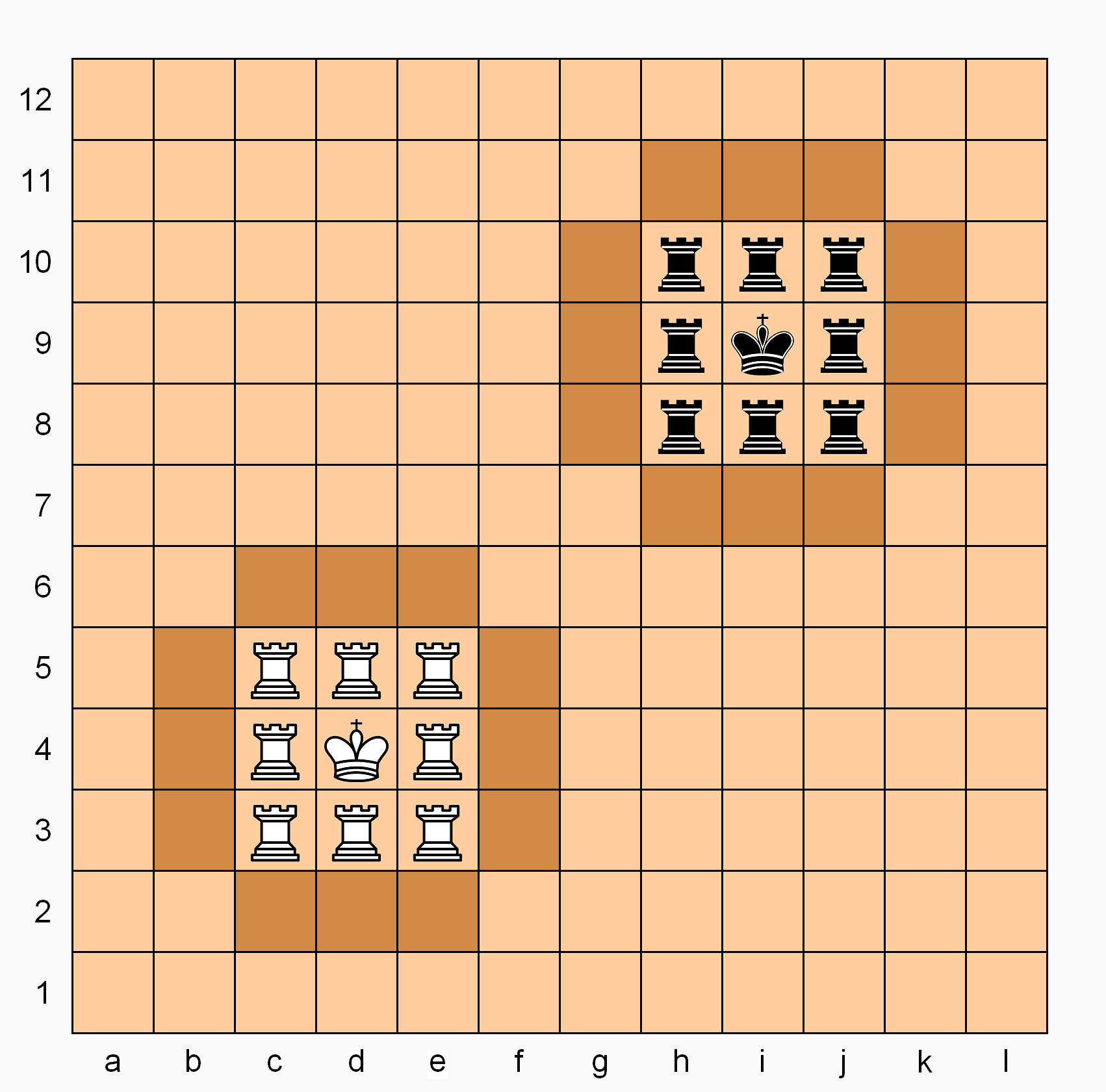|
Emergo (board Game)
Emergo is an abstract strategy game created by Christian Freeling and Ed van Zon in 1986 in games, 1986. It belongs to the "stacking" category of games, or column checkers, along with Bashni and Lasca. The name comes from the motto of the Dutch province of Zeeland: ''Luctor et emergo'' meaning: "I wrestle and emerge". The goal of the game is to capture all of the opponents pieces similar to Draughts, checkers/draughts. Emergo, and all column checkers, differ from most draughts variants because of their unique method of capture. An opponent's piece is added to the capturing player's column rather than being removed. Men can be recaptured from an opponent later on in the game. Rules Emergo has two players, Black and White. A 'piece' is defined as a column of one or more ''men''. Columns may consist of all white pieces, all black pieces, white with black ''prisoners'', or black with white ''prisoners''. The top man is called the ''cap'', with all the pieces underneath as ''prisone ... [...More Info...] [...Related Items...] OR: [Wikipedia] [Google] [Baidu] |
Emergo Match 2004 U-con
Emergo is a Latin word meaning "I emerge". It appears in or can refer to: *''Luctor et emergo'' - the motto of the Netherlands, Dutch province of Zeeland * the board game Emergo (board game), Emergo * A promotional gimmick used in showings of the 1959 film ''House on Haunted Hill'' * ''Apartment 143'', a 2012 film originally named ''Emergo'' {{disambig ... [...More Info...] [...Related Items...] OR: [Wikipedia] [Google] [Baidu] |
Abstract Strategy Game
An abstract strategy game is a type of strategy game that has minimal or no narrative theme, an outcome determined only by player choice (with minimal or no randomness), and in which each player has perfect information about the game. For example, Go is a pure abstract strategy game since it fulfills all three criteria; chess and related games are nearly so but feature a recognizable theme of ancient warfare; and Stratego is borderline since it is deterministic, loosely based on 19th-century Napoleonic warfare, and features concealed information. Definition Combinatorial games have no randomizers such as dice, no simultaneous movement, nor hidden information. Some games that do have these elements are sometimes classified as abstract strategy games. (Games such as '' Continuo'', Octiles, '' Can't Stop'', and Sequence, could be considered abstract strategy games, despite having a luck or bluffing element.) A smaller category of abstract strategy games manages to incorporate hidde ... [...More Info...] [...Related Items...] OR: [Wikipedia] [Google] [Baidu] |
Christian Freeling
Christian Freeling (born 1 February 1947, in Enschede, Netherlands) is a Dutch game designer and inventor of abstract strategy games, notably Dameo, Grand Chess, Havannah, and Hexdame. Freeling's designs cover a range of game types. Several of his games are endeavors to improve on established games that he concluded are flawed or limited in some way, while some introduce familiar game mechanics into uncommon settings. He also regularly translates rules for orthogonal board games to the hexagonal grid, resulting in new versions with altered properties – usually enhanced strategy and tactics options, and fewer draws. "Christian's games often embody a desire to get to the heart of the concepts used in abstract games. This is most clearly displayed by his minimalist chess variant, Chad, and his version of column checkers, Emergo." Among all his games, Freeling considers Dameo, Emergo, Grand Chess, Storisende, Sygo, and Symple to be his most important, with Emergo as hi ... [...More Info...] [...Related Items...] OR: [Wikipedia] [Google] [Baidu] |
1986 In Games
The year 1986 was designated as the International Year of Peace by the United Nations. Events January * January 1 ** Aruba gains increased autonomy from the Netherlands by separating from the Netherlands Antilles. ** Spain and Portugal enter the European Community, which becomes the European Union in 1993. * January 11 – The Sir Leo Hielscher Bridges, Gateway Bridge in Brisbane, Australia, at this time the world's longest prestressed concrete free-cantilever bridge, is opened. * January 13–January 24, 24 – South Yemen Civil War. * January 20 – The United Kingdom and France announce plans to construct the Channel Tunnel. * January 24 – The Voyager 2 space probe makes its first encounter with Uranus. * January 25 – Yoweri Museveni's National Resistance Army Rebel group takes over Uganda after leading a Ugandan Bush War, five-year guerrilla war in which up to half a million people are believed to have been killed. They will later use January 26 as the official date ... [...More Info...] [...Related Items...] OR: [Wikipedia] [Google] [Baidu] |
Bashni
Bashni (Russian: ба́шни, ''towers''), also known as column draughts, multi-level checkers, and rarer Chinese checkers, is a variation of draughts, known in Russia since the 19th century. The game is played according to the basic rules of Russian draughts, with the main difference being that draughts being jumped over are not removed from the playing field but are instead placed under the jumping piece (draught or tower). The resulting towers move across the board as one piece, obeying the status of the upper draught. When a tower is jumped over, only the upper draught is removed from it. If, as a result of the combat, the top draught changes colour, ownership of the tower passes on to the opposing player. Based on Bashni, but according to the basic rules of English draughts, world chess champion Emanuel Lasker developed the draughts game " Laska" and, in 1911, published its description. Lasker described towers that can only be "double-layered": i.e. there can be no alternati ... [...More Info...] [...Related Items...] OR: [Wikipedia] [Google] [Baidu] |
Lasca
Lasca (also called Laska or Laskers) is a draughts (or checkers) variant, invented by the second World Chess Champion Emanuel Lasker (1868–1941). Lasca is derived from English draughts (American checkers) and the Russian draughts game bashni (Towers). History Emanuel Lasker became familiar with bashni in the 19th century while participating in chess tournaments in Moscow and St. Petersburg. According to contemporary memoirs, in Moscow Lasker stayed in the house of D. I. Sargin, a famous historian, researcher, and popularizer of board games. By the time he met Lasker, Sargin was regularly editing columns on draughts (towers) in several Russian newspapers and magazines. The mutual influence of these famous researchers on each other is quite obvious, since Sargin is the author of the fundamental work "The Antiquity of the games of checkers and chess", and Lasker's book "Board games of Nations" was repeatedly reprinted. Public presentation of a new kind of columns draughts was ... [...More Info...] [...Related Items...] OR: [Wikipedia] [Google] [Baidu] |
Zeeland
Zeeland (; ), historically known in English by the Endonym and exonym, exonym Zealand, is the westernmost and least populous province of the Netherlands. The province, located in the southwest of the country, borders North Brabant to the east, South Holland to the north, as well as the country of Belgium to the south and west. It consists of a number of islands and peninsulas (hence its name, meaning "Sealand") and a strip bordering the Flanders, Flemish provinces of East Flanders, East and West Flanders. Its capital is Middelburg, Zeeland, Middelburg with a population of 48,544 as of November 2019, although the largest municipality in Zeeland is Terneuzen (population 54,589). Zeeland has two Port, seaports: Vlissingen and Terneuzen. Its area is , of which is water; it had a population of about 391,000 as of January 2023. Large parts of Zeeland are below sea level. The North Sea flood of 1953, last great flooding of the area was in 1953. Tourism is an important economic activ ... [...More Info...] [...Related Items...] OR: [Wikipedia] [Google] [Baidu] |
Draughts
Checkers (American English), also known as draughts (; Commonwealth English), is a group of strategy board games for two players which involve forward movements of uniform game pieces and mandatory captures by jumping over opponent pieces. Checkers is developed from alquerque. The term "checkers" derives from the checkered board which the game is played on, whereas "draughts" derives from the verb "to draw" or "to move". The most popular forms of checkers in Anglophone countries are American checkers (also called English draughts), which is played on an 8×8 checkerboard; Russian draughts, Turkish draughts and Armenian draughts, all of them on an 8×8 board; and international draughts, played on a 10×10 board – with the latter widely played in many countries worldwide. There are many other variants played on 8×8 boards. Canadian checkers and Malaysian/Singaporean checkers (also locally known as dam) are played on a 12×12 board. American checkers was weakly ... [...More Info...] [...Related Items...] OR: [Wikipedia] [Google] [Baidu] |
International Draughts
International draughts (also called international checkers or Polish draughts) is a Abstract strategy, strategy board game for two players, one of the variants of draughts. The gameboard comprises 10×10 squares in alternating dark and light colours, of which only the 50 dark squares are used. Each player has 20 pieces, light for one player and dark for the other, at opposite sides of the board. In conventional diagrams, the board is displayed with the light pieces at the bottom; in this orientation, the lower-left corner square must be dark. History According to Dutch Draughts historians, draughts historian Arie van der Stoep, it is unknown where the 10×10 square draughts board first came into use. In the Netherlands, the board was probably used from 1550, and the number of pieces was extended to 2×20 between 1650 and 1700. The name "Polish draughts" was probably following a Dutch convention of the time that "unnatural" ideas were considered "Polish". Rules The general rule ... [...More Info...] [...Related Items...] OR: [Wikipedia] [Google] [Baidu] |
Hexagon
In geometry, a hexagon (from Greek , , meaning "six", and , , meaning "corner, angle") is a six-sided polygon. The total of the internal angles of any simple (non-self-intersecting) hexagon is 720°. Regular hexagon A regular hexagon is defined as a hexagon that is both equilateral and equiangular. In other words, a hexagon is said to be regular if the edges are all equal in length, and each of its internal angle is equal to 120°. The Schläfli symbol denotes this polygon as \ . However, the regular hexagon can also be considered as the cutting off the vertices of an equilateral triangle, which can also be denoted as \mathrm\ . A regular hexagon is bicentric, meaning that it is both cyclic (has a circumscribed circle) and tangential (has an inscribed circle). The common length of the sides equals the radius of the circumscribed circle or circumcircle, which equals \tfrac times the apothem (radius of the inscribed circle). Measurement The longest diagonals of a ... [...More Info...] [...Related Items...] OR: [Wikipedia] [Google] [Baidu] |
Dameo
Dameo is an Abstract strategy game, abstract strategy board game for two players invented by Christian Freeling in 2000. It is a variant of the game draughts (or English draughts, checkers) and is played on an 8×8 checkered gameboard. Setup Dameo is played on an 8×8 checkerboard with 18 pieces per player. Each player's pieces are arranged so that the bottom three rows, from the perspective of the player, are filled from a1 to h1, b2 to g2, and c3 to f3, forming a distinctive trapezoid shape. Rules Strategy Dameo differs in tactics and strategies from other draughts/checkers variants due to its double grid and linear movement of men. Familiar concepts such as ''majority capture'', ''ladders and bridges'', and the ''coup turc'' are present, along with unique tactics and strategies, such as the ''oblique hit'' and the ''king's trap''. Majority Capture Majority capture is a fundamental part of Dameo. The substance of it is the sacrifice of two or more men in order to m ... [...More Info...] [...Related Items...] OR: [Wikipedia] [Google] [Baidu] |
Abstract Strategy Games
Abstract may refer to: *"Abstract", a 2017 episode of the animated television series ''Adventure Time (season 9)#ep262, Adventure Time'' * Abstract (album), ''Abstract'' (album), 1962 album by Joe Harriott * Abstract algebra, sets with specific operations acting on their elements * Abstract of title, a summary of the documents affecting the title to a parcel of land * Abstract (law), a summary of a legal document * Abstract (summary), in academic publishing * Abstract art, artistic works that do not attempt to represent reality or concrete subjects * ''Abstract: The Art of Design'', 2017 Netflix documentary series * Abstract music, music that is non-representational * Abstract object in philosophy * Abstract structure in mathematics * Abstract type in computer science * The property of an abstraction * Q-Tip (musician), also known as "The Abstract" * Abstract and concrete * Hydrogen atom abstraction, in chemistry See also * Abstraction (other) {{Disambiguation ... [...More Info...] [...Related Items...] OR: [Wikipedia] [Google] [Baidu] |





